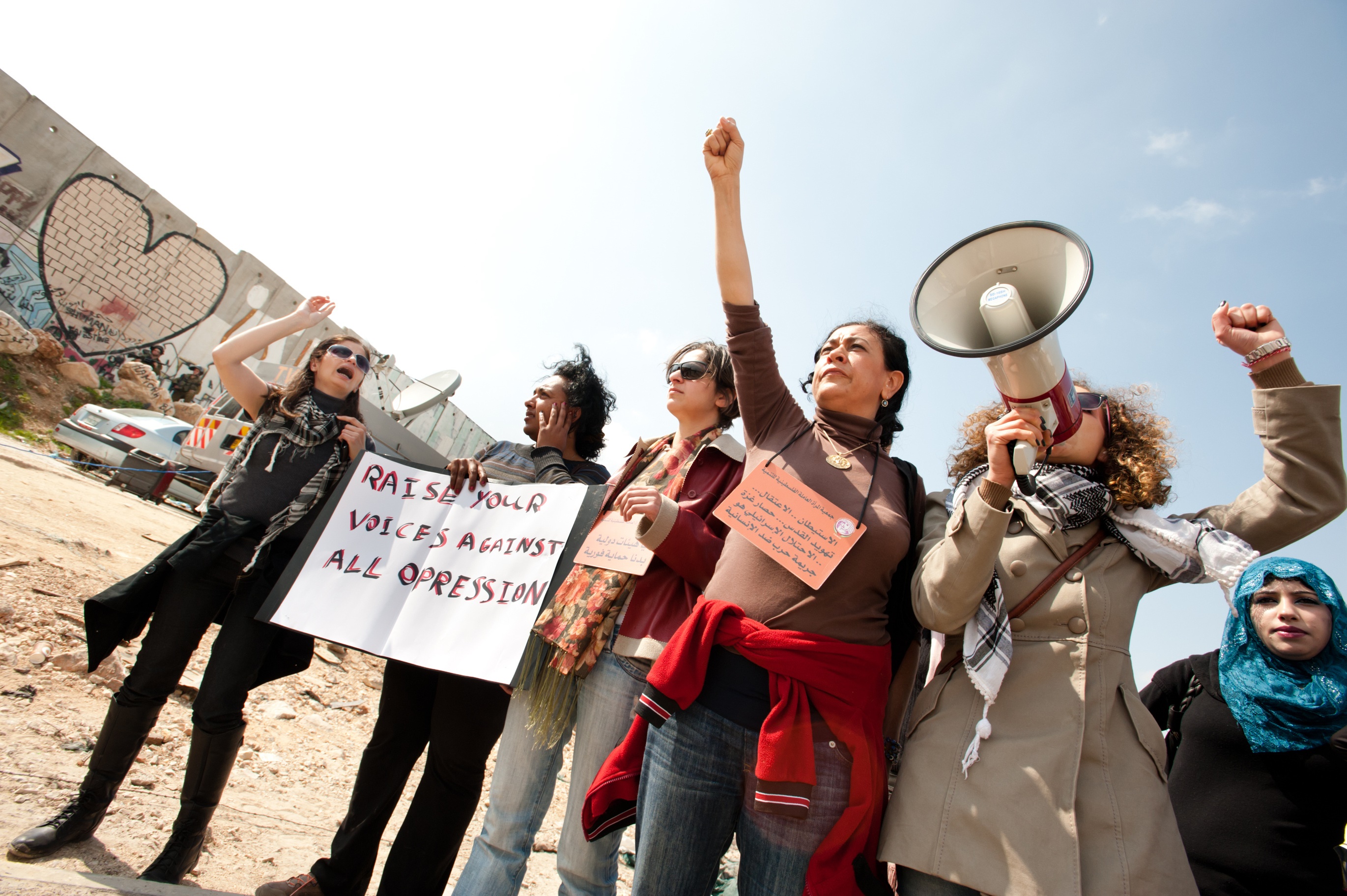
Palestinians March on International Women's Day in 2012 to protest Israeli occupation of Palestine. www.ryanrodrickbeiler.com
Happy International Women’s Day! Did you know that five women have been awarded Nobel Peace Prizes in the last ten years alone? Other than Malala Yousafzai, can you name any of them?
This International Women’s Day, we profile four women whose commitment to building peace around the world gets so little news coverage it has been all but forgotten -- even though it earned each of them a Nobel Peace Prize.

(Bouchamaoui, left, at the 2016 World Economic Forum. Photo courtesy of WORLD ECONOMIC FORUM/swiss-image.ch/Photo Remy Steinegger)
Wided Bouchamaoui (2015)
Remember the Arab Spring in 2011? Wided (also spelled Ouided) Bouchamaoui’s leadership earned her and three men -- together The Tunisian National Dialogue Quartet -- a Nobel Peace Prize in 2015 for the group’s “decisive contribution to the building of a pluralistic democracy in Tunisia in the wake of the Jasmine Revolution of 2011.”
The National Dialogue Quartet was formed in the summer of 2013, in response to a Tunisian democratization process that was on the brink of collapse in the wake of political assassinations, widespread social unrest, and controversy over the country’s newly-drafted constitution. The Quartet’s leaders represented four key organizations in Tunisian civil society: the Tunisian Confederation of Industry, Trade and Handicrafts; the Tunisian General Labor Union; the Tunisian Order of Lawyers; and the Tunisian Human Rights League. The group’s tireless and tactful negotiations resulted in Tunisia’s first free and fair presidential election and the most progressive constitution in the Arab world.

(Left to right Gbowee, Karman, and Sirleaf. Photo courtesy of Erik F. Brandsborg, Aktiv I Oslo.no on Flickr Creative Commons)
Ellen Johnson Sirleaf, Leymah Gbowee, and Tawakkol Karman (2011)
Sirleaf, Gbowee, and Karman were jointly awarded the Nobel Peace Prize in 2011 for their nonviolent pursuit of women’s safety and their right to participate fully in peace-building work.
Ellen Johnson Sirleaf, inaugurated in 2006, is Africa’s first democratically elected female president. In 2006, she opened a Truth and Reconciliation Commission to promote peace and unity by investigating more than 20 years of civil conflict in Liberia. In 2007, she issued an executive order making education free and compulsory for all school-aged children. She has appointed women to several high-level posts in her cabinet. She is also a member of the Council of Women World Leaders, a network that aims to mobilize the highest-level women leaders globally to act collectively on issues of critical importance to women.
Leymah Gbowee is a Liberian peace activist known for her mobilization of Women of Liberia Mass Action for Peace, a nonviolent grassroots movement that worked across ethnic and religious lines to bring peace to Liberia. While the Second Liberian Civil War dragged on, the organization pressured then-President Charles Taylor to attend peace talks in Ghana. The more than 2,000 women staged a sit-in outside of the Presidential Palace, blocking all doors and windows, to prevent the warring parties from leaving the peace talks without a resolution. As a result, the women successfully facilitated an end to the 14-year civil war and ushered in a period of peace that enabled Ellen Sirleaf Johnson to earn the presidency in Liberia’s first free and fair election.
Tawakkol Karman is a Yemeni journalist, politician, and human rights activist. She leads the group Women Journalists Without Chains, which she co-founded in 2005. She is the first Yemeni, the first Arab woman, and only the second Muslim woman to win a Nobel Prize. She is also the second youngest Nobel Peace Laureate to date.
Karman gained publicity in 2005 as a journalist and advocate for a mobile phone news service. After the service was denied a license in 2007, she began organizing demonstrations and sit-ins for press freedom and eventually became the international face of Yemen’s 2011 pro-democracy movement in 2011. She has been arrested twice for her political activity and demands for President Saleh’s resignation, and has received several threats, including a death threat from the President himself.
So why don’t we know the names of these extraordinary women? Regular old gender bias in coverage? An overall lack of coverage of peace-building and non-violent civil resistance? Tell us what you think in the comments.